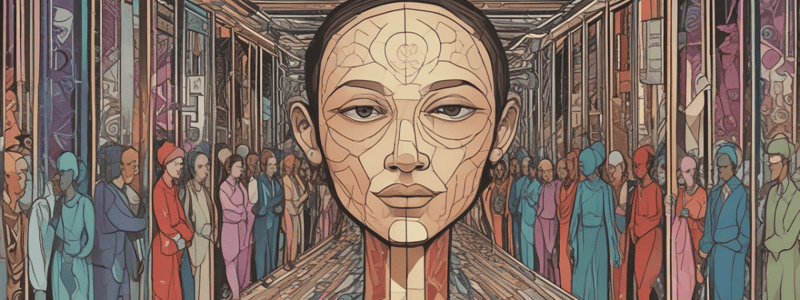Podcast
Questions and Answers
What is the main outcome of membership in a group?
What is the main outcome of membership in a group?
- Formation of new groups
- Increased autonomy
- Enhanced individual wellbeing (correct)
- Improved communication
Gangs are considered to be groups who gather temporarily for a specific reason.
Gangs are considered to be groups who gather temporarily for a specific reason.
False (B)
What are the three factors that contribute to an individual's positive wellbeing?
What are the three factors that contribute to an individual's positive wellbeing?
The satisfaction of their needs, comfort in their environment, and autonomy
People living in rural communities often enjoy the company of others who live in their _______________; these groups are generally tight-knit, surviving many generations and shared hardships.
People living in rural communities often enjoy the company of others who live in their _______________; these groups are generally tight-knit, surviving many generations and shared hardships.
What is the most common factor in the formation of specific groups?
What is the most common factor in the formation of specific groups?
GLBTI individuals and groups are often overlooked in the society.
GLBTI individuals and groups are often overlooked in the society.
What is the level of Maslow's hierarchy of needs where the need for security is identified?
What is the level of Maslow's hierarchy of needs where the need for security is identified?
Individuals forming groups around the common goal to help others or heighten their own _______________ is becoming more prevalent.
Individuals forming groups around the common goal to help others or heighten their own _______________ is becoming more prevalent.
Match the following reasons for group formation with their descriptions:
Match the following reasons for group formation with their descriptions:
What is the basis for forming a group among retirees living in a caravan village?
What is the basis for forming a group among retirees living in a caravan village?
What is a significant factor in determining who we are and how we interact with others?
What is a significant factor in determining who we are and how we interact with others?
All groups are long-term gatherings.
All groups are long-term gatherings.
What is a common characteristic of groups?
What is a common characteristic of groups?
Groups can be either _______________ or destructive for individuals and the community.
Groups can be either _______________ or destructive for individuals and the community.
What is a common type of primary group?
What is a common type of primary group?
All family groups are functional and harmonious.
All family groups are functional and harmonious.
What is a characteristic of people in family groups?
What is a characteristic of people in family groups?
Match the following group types with their definitions:
Match the following group types with their definitions:
What is a benefit of living in close geographic proximity to others from the same cultural group?
What is a benefit of living in close geographic proximity to others from the same cultural group?
Gay, lesbian, bisexual, transgender, and intersex (GLBTI) individuals are not legally recognized in Australia.
Gay, lesbian, bisexual, transgender, and intersex (GLBTI) individuals are not legally recognized in Australia.
What is a specific need that individuals may have based on their cultural situation?
What is a specific need that individuals may have based on their cultural situation?
The ______ barked
The ______ barked
Match the following groups with their primary purpose:
Match the following groups with their primary purpose:
Why do individuals and families seek spiritual fulfillment through worship?
Why do individuals and families seek spiritual fulfillment through worship?
An individual's sense of security is not affected by living alone.
An individual's sense of security is not affected by living alone.
What is a benefit of group membership?
What is a benefit of group membership?
The religious landscape of Australia is diversifying in line with multicultural ______.
The religious landscape of Australia is diversifying in line with multicultural ______.
What is a reason why cultural groups may form?
What is a reason why cultural groups may form?
What is a characteristic of friendship groups?
What is a characteristic of friendship groups?
Religious groups are formed around common interests and hobbies.
Religious groups are formed around common interests and hobbies.
What is the primary purpose of sporting and leisure groups?
What is the primary purpose of sporting and leisure groups?
According to the 2011 Census, ________ per cent of the Australian population adhered to Christianity.
According to the 2011 Census, ________ per cent of the Australian population adhered to Christianity.
What is a characteristic of cultural groups?
What is a characteristic of cultural groups?
Study and work groups are not formed around common goals and objectives.
Study and work groups are not formed around common goals and objectives.
What is the primary mission of religious groups?
What is the primary mission of religious groups?
Match the type of group with its description:
Match the type of group with its description:
According to the 2011 Census, ________ per cent of the Australian population declared 'no religion'.
According to the 2011 Census, ________ per cent of the Australian population declared 'no religion'.
Minority groups are not an example of specific groups within the community.
Minority groups are not an example of specific groups within the community.
Study Notes
Types of Groups
- Family and Friendship Groups: Based on kinship ties or social bonds, these groups are the most common type of primary group, where people spend a lot of time together, engage in various activities, and know each other well.
- Sporting and Leisure Groups: These groups are formed for recreational activities, providing a fun and interactive way for members to stay fit and healthy or engage in activities that promote personal wellbeing.
- Study and Work Groups: Examples include pairs or groups of students who study, problem-solve, and assist each other, as well as service work groups that engage in labor for the good of others.
Religious Groups
- Formed around the common beliefs, traditions, and values held by a specific doctrine or faith, with the primary mission of promoting spiritual growth and nurturing individuals and their communities.
- According to the 2011 Census, 61.14% of the Australian population adheres to Christianity, 22.3% declared 'no religion', and 8.55% did not wish to answer the question.
Cultural Groups
- Based on the geographic area in which a group originated or developed, sharing social and cultural characteristics.
- Classification is based on self-perceived group identification, with the extent to which an individual associates with a specific cultural group's ideals and philosophies.
- Examples include Indigenous Australians, Australians from over 200 countries, each with their own cultural characteristics.
Other Specific Groups
- Minority groups, such as support groups for men, sole parents, bushfire victims, and people with health issues like cancer, depression, diabetes, and dementia.
- Volunteer groups, such as St Vincent de Paul and the Australian Red Cross.
- Groups associated with civil unrest, mobs, and gangs.
Group Effectiveness
- Factors contributing to an individual's positive wellbeing include:
- Satisfaction of their needs
- Comfort in their environment – physical and socioemotional
- Autonomy, or their ability to have some control over their destiny
- Effective communication and eliciting a response
Reasons for Group Formation
- Locality/Geography: Groups form due to members living in a specific region, area, or geographical place.
- Gender: Groups form based on gender, with many public amenities being segregated, and marketing and media targeting specific genders.
- Shared Interest/Common Goal: Individuals form groups based on similar values, interests, and goals.
- Security: The need for security is a driving factor in group formation, as individuals seek to feel safe and secure.
- Sexuality: GLBTI individuals form social groups based on shared values, beliefs, and experiences.
- Specific Need: Groups form to satisfy specific needs based on economic, physical, cultural, socioemotional, and intellectual situations.
- Social Interaction: Groups form to satisfy the need for social interaction, such as males meeting at the football or stay-at-home parents meeting at cafés.
- Religion: Groups form based on religious affiliations, with the religious landscape of Australia diversifying in line with multicultural immigration.
- Culture: Groups form to reflect on and celebrate cultural practices, traditions, and values.
Studying That Suits You
Use AI to generate personalized quizzes and flashcards to suit your learning preferences.
Description
This quiz explores how community groups, family, and environmental factors shape our individual identity, values, and behaviors. It delves into the interplay between hereditary and environmental factors that influence our interactions with others.




